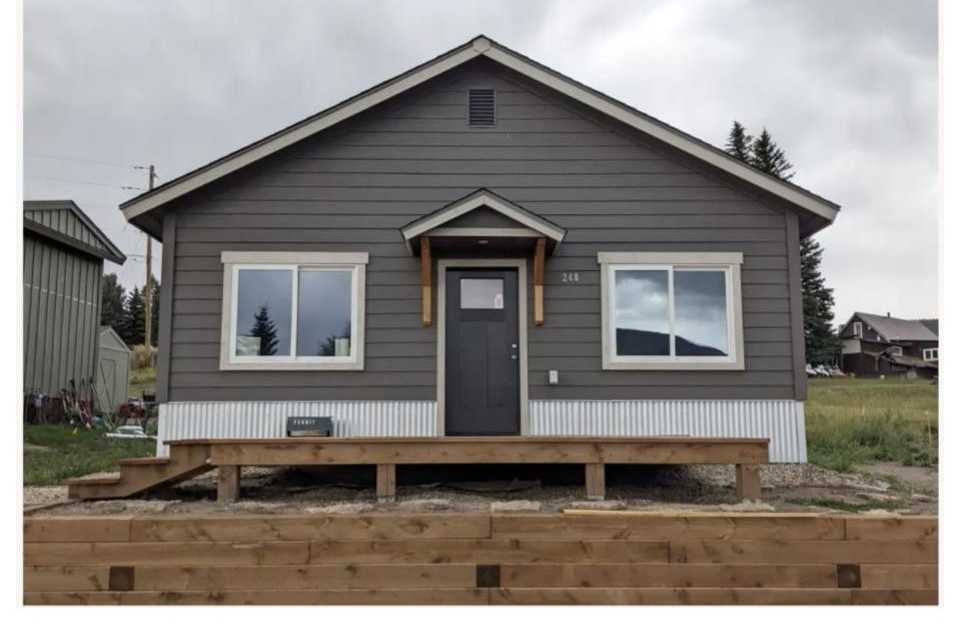We are currently not accepting applications for our homeownership program.
Habitat for Humanity of Grand County homes are sold at little or no profit with an affordable mortgage with our partner USDA RD 502 loan program to qualified homebuyers. Homes are built to accommodate families of all types and sizes.
The typical Habitat for Humanity of Grand County home is sold with an affordable mortgage that can be paid back with a term of up to 38 years. Mortgage lengths vary depending on the household income of the homebuyer. At the time of sale, monthly mortgage payments are no more than 30% of the household’s gross monthly income. With each mortgage payment, Habitat homeowners are directly investing in their family’s future.
The selection of families to purchase homes from Habitat for Humanity of Grand County is done by a Family Selection Committee in a way that does not discriminate because of race, color, religion, sex, handicap, familial status, sexual orientation, age, gender identity, or national origin. Habitat Grand County does not discriminate if all or part of an applicant’s income is derived from public assistance programs.
After watching our Preparation for Homeownership video, email the password and we will send you the application for potential homeownership with Habitat for Humanity of Grand Count at buyers@habitatgrandcounty.org.
Homeownership FAQ
How are families selected?
Individuals are selected for Habitat’s homeownership program based on their ability to demonstrate that they meet three main criteria – an ability to repay a mortgage, a willingness to partner with our organization, and a current need for housing. In order to determine if an individual meets these criteria, an application must be completed and submitted to Habitat during an open application cycle.
When are applications accepted?
Applications are typically accepted once a year. If more home slots become available throughout the year, additional application cycles may be opened. To stay updated on application cycles.
What if there are more applicants than homes available?
If applicants can demonstrate that they meet all criteria, but there are more applicants than home slots available, applicants are prioritized based on their need for housing. If an applicant is denied because there are not enough homes available, the applicant is welcome to apply in the future. Habitat cannot keep a wait list.
If I apply and my application is denied, can I apply at a future date?
Applicants are welcome to apply as many times as they would like. If an application is denied, the applicant will be offered guidance on what items could be corrected for a stronger application in the future.
How long does it take to purchase a Habitat home?
The process of building and purchasing a Habitat home takes anywhere from twelve to eighteen months from the time that an applicant is approved to participate in the program. For this reason, Habitat for Humanity of Grand County cannot address immediate or emergency housing concerns.
What is the cost of a Habitat home?
Habitat sells houses for market value, which cannot be determined until the house is complete. Home prices vary depending on location and housing market conditions.
Regardless of the sales price of the house, Habitat is committed to keeping housing payments affordable. Habitat homeowners’ mortgage payments will be capped at 30% of their household gross monthly income at the time of sale. This monthly amount will include the mortgage payment, homeowners’ insurance, property taxes and HOA dues (if applicable).
What is the length of a Habitat mortgage in partnership with USDA RD 502 loan program?
USDA RD 502 mortgages will be paid back between thirty-three and thirty-eight years. The length of the loan is dependent the household’s income at the time of sale however never more than 30% of their household gross monthly income at the time of sale.
Do applicants get to choose where they live?
We are currently building in Hot Sulphur Springs.
Do applicants get to choose the design of their home?
Habitat is not a custom home builder. A standard floor plan is used in each of our neighborhoods.
How does Habitat determine what size home a household will receive?
A bedroom policy is used to determine the house size received by each household. The policy states that no more than two individuals will share a room, children of opposite genders will not share a room and children more than five years apart in age will not share a room. If children are the same gender and less than five years apart, they will share a room. Homes are not built with extra bedrooms. They are built to accommodate current family size.
Can the home be sold?
Habitat homes can be sold. Like any home, there are times when it is more advantageous and times when it is less advantageous to sell the home. Typically, the longer a homeowner stays in the Habitat home, the better the outcome of selling the home.
Habitat homes will be sold with a Right to Repurchase and Shared Appreciation Agreement. This means that the owner must offer Habitat the right to repurchase the home before it can be sold on the open market. A Shared Appreciation agreement gives Habitat shared equity in the appreciated value of the home. This agreement allows Habitat to be a faithful steward of the time and money donated to ensure that Habitat homes stay affordable. Additionally, a Deed Restriction will be recorded against the property to ensure that the affordability continues to the next homeowner.
Can Habitat homes be rented?
Habitat homes cannot be rented. The owner must be the primary occupant for the life of the loan.
How are Habitat homes kept affordable?
Habitat for Humanity of Grand County uses a variety of methods to ensure that all homes are kept affordable for home buyers. Habitat works diligently to create partnerships with corporations, faith entities, government, and individuals to raise funds for each home built. Habitat uses a combination of staff and volunteer labor to help construct the home. Habitat seeks grant funding to help subsidize mortgage costs.
Can the home be sold?
Habitat homes can be sold. Like any home, there are times when it is more advantageous and times when it is less advantageous to sell the home. Typically, the longer a homeowner stays in the Habitat home, the better the outcome of selling the home.
Habitat homes will be sold with a Right to Repurchase and Shared Appreciation Agreement. This means that the owner must offer Habitat the right to repurchase the home before it can be sold on the open market. A Shared Appreciation agreement gives Habitat shared equity in the appreciated value of the home. This agreement allows Habitat to be a faithful steward of the time and money donated to ensure that Habitat homes stay affordable. Additionally, a Deed Restriction will be recorded against the property to ensure that the affordability continues to the next homeowner.
Can Habitat homes be rented?
Habitat homes cannot be rented. The owner must be the primary occupant for the life of the loan.
How are Habitat homes kept affordable?
Habitat for Humanity of Grand County uses a variety of methods to ensure that all homes are kept affordable for home buyers. Habitat works diligently to create partnerships with corporations, faith entities, government, and individuals to raise funds for each home built. Habitat uses a combination of staff and volunteer labor to help construct the home. Habitat seeks grant funding to help subsidize mortgage costs.
Can Habitat homes be rented?
Habitat homes cannot be rented. The owner must be the primary occupant for the life of the loan.
How are Habitat homes kept affordable?
Habitat for Humanity of Grand County uses a variety of methods to ensure that all homes are kept affordable for home buyers. Habitat works diligently to create partnerships with corporations, faith entities, government, and individuals to raise funds for each home built. Habitat uses a combination of staff and volunteer labor to help construct the home. Habitat seeks grant funding to help subsidize mortgage costs.

